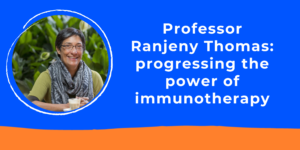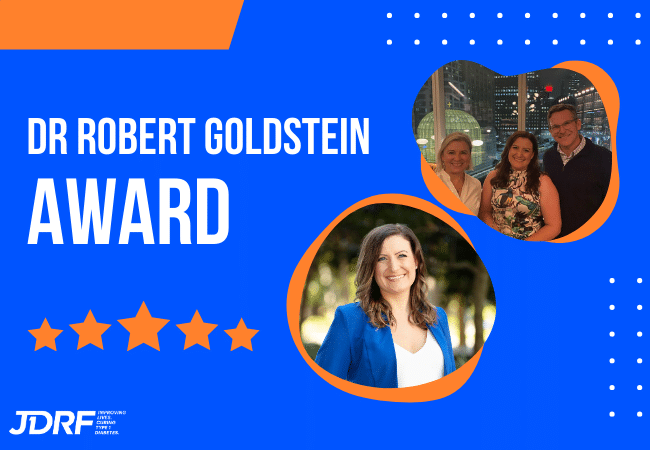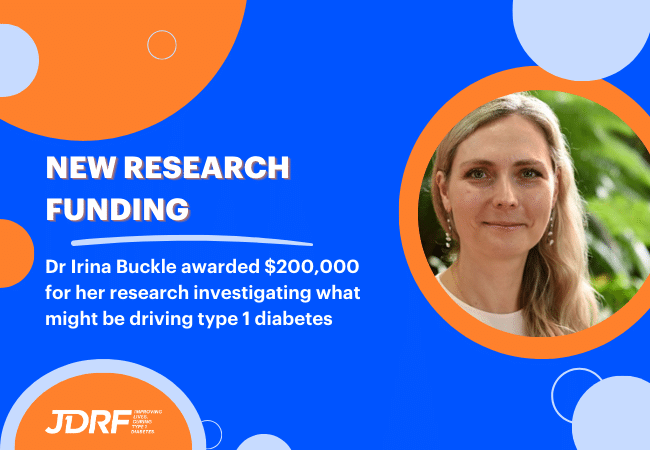Meet world leading immunologist, Professor Ranjeny Thomas

Meet Professor Ranjeny Thomas: progressing the power of immunotherapy for type 1 diabetes
The immune system is a wonderous guardian of the body, defending us against infections, while making sure that the body’s own cells are protected. The immune system keeps a record of everything it has ever defeated so it can quickly recognise the threat the next time.
However, what happens if our immune system mistakenly attacks our own cells, instead of a foreign threat? This is known as an autoimmune condition, and there are more than 80 such diagnoses known to science – including type 1 diabetes (T1D).
While researchers have identified similarities in genetic risk factors for chronic autoimmune conditions like T1D and rheumatoid arthritis, they have so far had limited success in developing therapies that can “retrain” the immune system not to mistakenly attack itself.
This is an incredibly exciting area of research, with the potential to change the trajectory of autoimmune conditions like T1D if answers can be unlocked.
Professor Ranjeny Thomas is a world leading immunologist at the University of Queensland, and a consultant rheumatologist at the Princess Alexandra Hospital, Brisbane, who is aiming to do just that.
She says that “if we can teach the immune system not to attack the insulin producing cells in the pancreas, type 1 diabetes could be prevented and treated at an early stage, which would be a complete gamechanger for the condition.”
Professor Thomas has been supported for almost two decades by JDRF and is also supported by other key funders in T1D research including The Leona M. and Harry B. Helmsley Charitable Trust (Helmsley).
Read on to learn about the inroads this support has made possible for her research into immunotherapies and T1D.
Progressing immunotherapy discoveries
Spanning almost 20 years of research in rheumatoid arthritis, Professor Thomas and her team demonstrated in experimental models that the immune system could be prevented from attacking itself through increasing the body’s tolerance of its own cells. They did this by injecting nanoparticles encapsulating small fragments of proteins (antigens) from the arthritic joint tissue together with an immunomodulatory drug (vitamin D3). This nanoparticle delivery system re-establishes disease-specific tolerance in patients, without impairing normal immunity and the ability to fight infections.
Professor Thomas then adapted this approach, known as an “antigen-specific immunotherapy”, to prevent the destruction of insulin producing cells. Using pre-clinical experimental models led by Associate Professor Emma Hamilton-Williams, the team found this approach had similar effects on the immune system, suggesting that nanoparticles incorporating insulin fragments (antigens) and vitamin D3 could be used for treatment of T1D as well.
JDRF funding was imperative to enable initial proof-of-concept for antigen-specific immunotherapy in T1D, with multiple grants awarded between 2003 and 2015.
In 2017, JDRF and Helmsley then partnered to support Professor Thomas to complete preclinical studies that were required to progress this therapy to a first-in-human clinical trial in people living with T1D. The funding also supported the development of various laboratory methods to determine the impact of the UQ nanoparticle technology on the immune system of potential trial participants, moving towards an immunotherapy approach to T1D treatment. Collaboration with Paediatric Endocrinologists at Queensland Children’s Hospital is crucial for this work.
With further funding from Helmsley, Professor Thomas also engaged with contract manufacturing and toxicology organisations, and regulatory and commercialisation experts for clinical grade production and large batch scale-up of the product, followed by formal preclinical safety studies. These crucial steps ensure suitability of a novel drug product for administration to humans, necessary to progress to the clinical trial phase of drug development.
“As a clinical rheumatologist and a scientist specialising in immunology, I recognised the similarities between autoimmune conditions and the potential for my work in rheumatoid arthritis to unlock answers for type 1 diabetes. It helped that my sister Helen worked on type 1 diabetes, and she got me started on this transition into diabetes almost two decades ago!
“My team has been dedicated to discovering cures for these conditions for many years and having completed two clinical trials in rheumatoid arthritis we are very excited to progress into our first clinical trial of antigen-specific immunotherapy with type 1 diabetes patients.”
The impact on patients
Building on almost $7m of investment from JDRF and Helmsley, and sustained funding from the Australian Government (NHMRC) over 20 years, Professor Thomas is now closer than ever to delivering a game-changing therapy for the T1D community.
Earlier this year, the Medical Research Future Fund’s national CUREator Scheme awarded $1.5m to Liperate Therapeutics Pty Ltd, a start-up company established by UniQuest, UQ’s commercialisation company, with Professor Thomas as the scientific founder. The funding will see Professor Thomas launch the antigen-specific immunotherapy into its first-in-human clinical trial, anticipated in 2023.
The immunotherapy is expected to begin trials in adults with recently diagnosed T1D, and if the trial demonstrates safety and evidence of its expected effect on the immune system, there is a potential for larger trials in newly diagnosed children and adults.
“My research has always been focused on changing the lives of people with or at risk of type 1 diabetes. Making a substantial impact is only possible with a fantastic team of scientists and clinicians, and funding from generous partners, including JDRF and Helmsley, which has underpinned our success in the highly competitive CUREator Scheme.
“I have loved working with JDRF and Helmsley. Thanks to their support, I have been able to develop my discoveries from initial conceptualisation all the way through to clinical trials, and my hope is that this will bring great benefits for people living with this condition.
“Our entire team is committed to unlocking new ways to re-educate the immune system to protect its insulin-producing cells. If we are successful and we could change the outcome of a diagnosis of type 1 diabetes, this would be a dream come true.”
To learn more about Professor Thomas research and for information on how to participate in this research, email di.diabetes@uq.edu.au
The application of this antigen specific immunotherapy technology as a treatment for type 1 diabetes and certain other autoimmune diseases is available for partnering or investment from UniQuest.
—
About JDRF’s Research
JDRF’s research strategy ensures that the researchers and projects funded are designed to unlock new knowledge, fill unanswered gaps, and move us closer to a world without type 1 diabetes.
This includes identifying the best and brightest researchers and providing sustained funding and support so their research can progress from early-stage discovery, through to patient impact.
Professor Thomas is one example of the success made possible when the best researchers are supported with adequate and continued funding.
You can learn more about JDRF’s research strategy and projects here.




